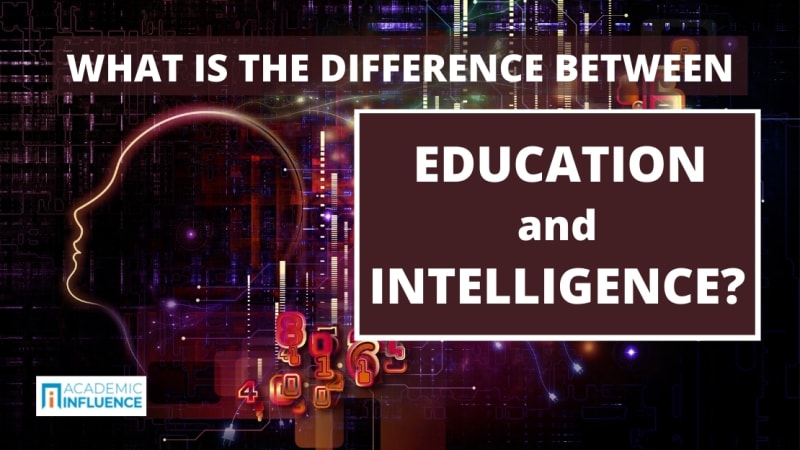What is the Difference Between Education and Intelligence?

Is there a difference between education and intelligence? And if so, what is it? We explore two sides of the same coin.
Key Takeaways
- Education is related mostly to academics, but it is not similar to intelligence as the latter is related to anything in which a person is extremely good. And while education is not crucial for survival, intelligence these days is considered essential for living.
- It’s not imperative for someone to be educated. Sometimes, an illiterate person is even more intelligent than the educated one. Thus, being uneducated doesn’t necessarily mean being unintelligent.
- Books, tutors, and teachers are utilized in obtaining an education. Intelligence, on the other hand, is an internal force of someone that can further be enhanced with proper training.
The phrase “education versus intelligence” is a bit of a red herring. Education and intelligence are not in competition. Education and intelligence are complimentary-two sides of the same coin. But is there a difference between education and intelligence? And if so, what is it?
If you’re not looking for the answers to humankind’s greatest questions, and you’re just here because you’re in search of tips for crushing it in school, we recommend Boosting Your Study Skills with our Study Guides and Study Starters.
Otherwise, read on for a look at the difference between education and intelligence...

Education and Intelligence: Let’s Spell the Difference
Education versus Intelligence: which is more significant? Many people believe that intelligence and education are equal, while some believe one is more important and better than the other. The two are even used interchangeably, especially when describing an individual who has a high IQ level.
When a person has had formal education, we call them intelligent. Conversely, we believe intelligent people are also well-educated. But there are differences between both that are worth noting.
The Hallmarks of Intelligence
One’s level of intelligence, which often points to an innate and natural ability, is relatively dependent on different factors like the person’s genetics, environment, upbringing, and access to education. Broadly speaking, intelligence is commonly defined as one’s potential or capacity to understand things. To gauge one’s capacity for learning, tests can be performed, like an IQ test.
Intelligence may also be related to DNA. Everybody is born with a certain capacity for learning, often influenced by the intelligence of one’s parents. If your parents have very high IQ’s, chances are, you will also have a good level of intelligence. Although genetic factors play 50% of one’s intelligence, the rest is determined by nutrition, experience, education, and environment.
Although a DNA test may reveal your capacity for intelligence, your intellect is not fixed. Thus, it helps to sharpen your mind by challenging yourself mentally and vowing to learn new things religiously. It also helps to minimize your oxidative stress with antioxidants, and feed your mind with proper nutrition, so you can function more efficiently.
The Types of Intelligence:
LOGICAL Intelligence
This is your calculating and reasoning ability. With this kind of intelligence, you think abstractly and conceptually, and you are also good with numbers (arithmetic and mathematical problems).
LINGUISTIC Intelligence
This is your capacity to use the right words at the right time. You have rich vocabulary skills, and you can easily grasp different languages.
VISUAL SPATIAL Intelligence
This is one’s ability to see a 3D picture without difficulty. In general, it’s relatively easy for your to see and understand the pictures of art.
NATURALISTIC Intelligence
Here, you can read and understand all natural things, including loving animals and nature.
MUSICAL Intelligence
It is your ability to understand and feel music, and be sensitive towards it.
EXISTENTIAL intelligence
This is the ability to ask and resolve difficult problems or questions in life.
BODILY-KINESTHETIC Intelligence
This is an ability to use the body and mind simultaneously while doing different tasks.
INTERPERSONAL Intelligence
This is one’s ability to maintain a healthy balance of emotions between themselves and others.
INTRAPERSONAL Intelligence
This is the ability to understand and accept one’s self, including understanding one’s feelings, strong abilities, weaknesses, and more.
Some also obtain intelligence education, which is often the ability to adapt to external forces, and adjust to informal and formal learning environments.
The Hallmarks of Education
Education is where you process your knowledge, skills, and talents through experience, training, and research. It helps develop your character and gives way to greater intelligence. It also helps you discover how you can maximize your intelligence effectively.
While genes play a lot in one’s intelligence, your capacity for education is also influenced by genes. According to research, 20-40% of one’s primary education is because of one’s genetics, while the rest is by environmental factors. Your cognitive function, personality traits, and brain development are just as important too.
Education and Intelligence: Where Do They Overlap?
Both education and intelligence are two concepts closely associated with cognitive functioning and brainpower. The more efficient the brain works, the easier it is for someone to respond well to education and hone their intelligence. Education is a tool, while intelligence is characteristic.
 Back to Top
Back to Top What Is Education?
Education is the act of giving or receiving knowledge. The dictionary defines education as “a process of teaching, training, and learning.” The word education is also used as a catch-all to describe all the knowledge that you’ve collected during that process.
The word education is also used as a catch-all to describe all the knowledge that you've collected during that process.”
Many formal definitions emphasize the role of school in education. But not all education takes place in the classroom. Education also refers to the knowledge you collect from life experiences like travel, teamwork, creativity, fitness, self-care, mental health counseling and yes, even from social media...if you know how to use it wisely.
We only go to school for a few years of our lives. But learning is a lifelong process.
Back to TopWhat Is Intelligence?
Intelligence is the innate ability to acquire, keep, and apply information. Intelligence can be characterized as your educational potential. This educational potential is sometimes referred to as aptitude.
According to Very Well Mind, some researchers believe intelligence is “a single, general ability,” while others view intelligence as a collection of overlapping abilities and aptitudes within each of us.
From this view, there are nearly infinite types of intelligence. When we think of intelligence, we may picture an eloquent writer, a bold scientist, or an ambitious software engineer. But it also requires a specific type of intelligence to become a skilled machinist, an elite athlete, or a visionary artist.
Everybody has intelligence. Intelligence exists on a broad spectrum. Each of us possesses certain intelligences. The unique combination of these intelligences is partly what determines our interests, our strengths, and even our professions.
Back to TopWhat Is the Difference Between Intelligence and Education?
The difference between intelligence and education is that intelligence comes from within whereas education comes from without.
Intelligence is innate. It is not a thing one actively pursues, but a thing that is either inborn, nurtured, or some combination of the two.The difference between intelligence and education is that intelligence comes from within whereas education comes from without.”
Education, by contrast, is a thing which one can pursue, advance, and actively seek. Indeed, intelligence won’t cost you a thing but a topflight education can cost you tens of thousands of dollars.
Back to TopAre Intelligence and Education Related?
Intelligence and education are directly related. You can’t have one without the other. Well, you could, but neither would be very rewarding.
Education without intelligence is an empty collection of information. In such a context, each of us would be akin to a primitive computer database, capable of stockpiling information but without the functions to understand or use this information.
On the flip side, intelligence without education is like an engine without any fuel. It may have the raw power to propel you, but until you fill up the tank, you aren’t going anywhere. So while education and intelligence may refer to different things, they come together to forge some of the essential features that make you who you are, from your potential to your achievements, from your capabilities to your character, from your talents to your passions.
If you’d like to transform your natural intelligence into a great education without leaving your home, the best place to start is our list of the Best Online Colleges 2022.